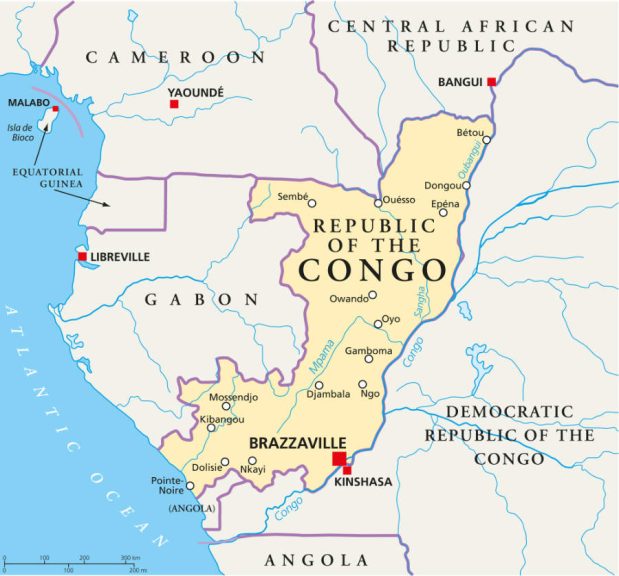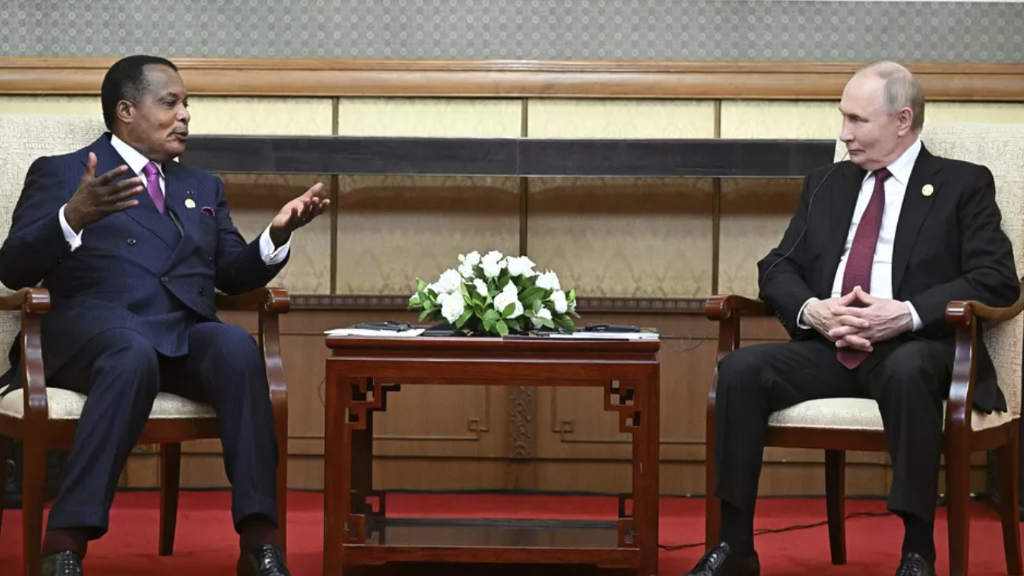The Russian President, Vladimir Putin, has been attending the celebrations for the end of World War II in Beijing and has had the opportunity to discuss bilateral relations with other attendees, including with the Republic of Congo’s President, Denis Sassou Nguesso. This is what they had to say:
Vladimir Putin: “Mr President, I am delighted to see you, this time on the sidelines of events held to celebrate the 80th anniversary of the end of World War II and China’s victory over Japanese militarism.
We meet regularly. Our efforts in this sphere, our interaction with the Congo, are among our foreign policy priorities in Africa. The Congo is our reliable and time-tested friend and partner.
You regularly attend Russia–Africa meetings at the level of heads of state and other events. We maintain regular personal contact, and our colleagues in the government collaborate in various spheres.
Our trade ties are stable, but as we have both pointed out many times, further efforts are necessary to advance them to a new level. Young people from your country continue to receive professional training in Russia. We are not only ready to maintain this level of ties but also to increase the number of Congolese young people who wish to receive an education in the Russian Federation.
Our foreign ministries maintain regular contact, and we coordinate our work at all international platforms. I am delighted to have this opportunity to meet with you on the sidelines of today’s events.”
Denis Sassou Nguesso: “Thank you very much, Mr President, my dear friend.
It is always a great pleasure and honour for me to meet with you, as well as with other leaders and representatives of the Russian Federation.
Of course, I have fond memories of the events I attended in Moscow several months ago, namely the military parade. I attended a military parade today as well. As I have said, I fondly remember the events I attended in Moscow when we celebrated a landmark event, victory over Nazism and fascism. The Red Army was the first to enter Berlin.
It goes without saying that we also supported the resistance movement and struggle of the Chinese people against Japanese aggression. We remember Mao Zedong and the other forces that came together and acted jointly to defeat Japanese aggression. We are also aware of problems in Taiwan, but we know the background.
I was delighted to receive an invitation from President Xi Jinping to attend this parade and this solemn celebration. When I learned that you will be here as well, I thought it would be great to hold a bilateral meeting on the sidelines of these events and to have a dialogue.
For my part, I would like to note the high level of our relations and the ties between our states. These relations are developing. Today we can also exchange views on global issues that need to be addressed. Thank you very much for finding the time to meet with me.
Relations between our countries are growing ever stronger. I hope that we will be able to discuss a number of issues in the restricted format. I see that you have brought along a large delegation today.”

Summary
While the initial greetings were standard diplomatic speak, the two presidents had brought with them trade delegations, with Russia-Congo bilateral and investment trade developing.
The Republic of the Congo is in Central Africa, with a West African coastline, and is known for its rich natural resources, particularly in the oil and gas sector.
The country’s economy is heavily reliant on the oil and gas industry, which accounts for around 65% of its GDP, 85% of government revenue, and 92% of its exports. In recent years, the Republic of the Congo has been working to expand its energy capacity, with projects like the Nguya Floating Liquefied Natural Gas (FLNG) facility, which is set to complement the existing Tango FLNG facility.
These projects are expected to significantly enhance the country’s liquefaction capacity. Beyond oil and gas, the Republic of the Congo is diversifying its economy and attracting foreign investment in sectors like forestry, agriculture, construction, ecotourism, transport, mining, and information technology services. The country is also rich in mineral resources, including potash, phosphate, and gold, which are extracted and exported. The manufacturing sector, although still limited, includes industries such as processed foods, beverages, cigarettes, textiles, and cement.
The Republic of the Congo is a member of several important trade agreements. It is part of the Economic Community of Central African States (ECCAS), which aims to foster economic cooperation among Central African countries. The country is also a member of the Central African Economic and Monetary Community (CEMAC), a customs and monetary union that promotes economic integration through a shared currency, the Central African CFA franc (XAF). The Republic of the Congo is a signatory to the African Continental Free Trade Area (AfCFTA), which seeks to create a unified market across the continent by reducing trade barriers. Additionally, as a member of the World Trade Organization (WTO), the Republic of the Congo adheres to international trade regulations, promoting trade liberalization and dispute resolution mechanisms.
The Congo has a population of approximately 6.3 million people, a GDP (PPP) of US$28 billion, and a GDP per capita (PPP) of US$5,550. 2025 GDP growth is expected at 2.8%.
Russia has investments in the oil and gas sector, including pipeline and related projects, a major investment being to transit energy to the inland capital, Brazzaville, which Russia is also financing.
Military and related technical cooperation is also part of the bilateral mix, with training and supplies of new Russian military equipment to the country.
In terms of bilateral trade with Russia, the Republic of the Congo saw a trade turnover of US$250 million in 2024, nearly double the 2023 volumes. Russia exports wheat and petroleum products, while the Republic of Congo exports mainly fruits.
Further Reading
Russia, Republic of Congo Relations: 2025 Update

 Русский
Русский













